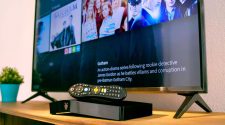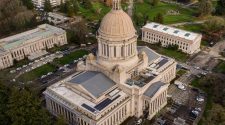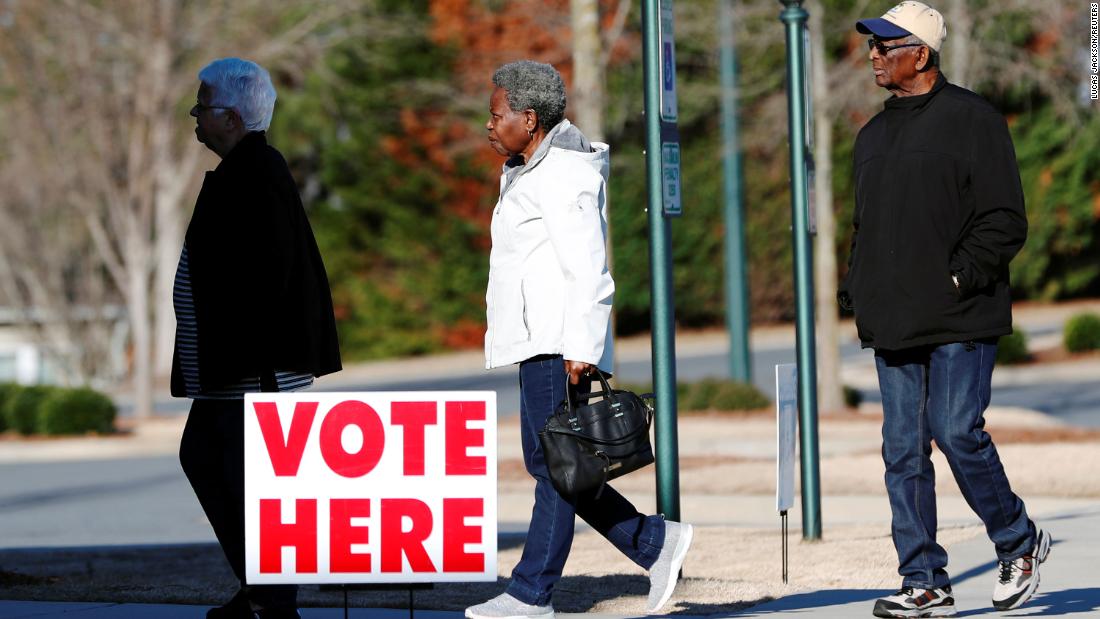It is the first state with a majority black electorate to weigh in on the Democratic nomination fight. The racial composition of South Carolina’s Democratic primary electorate has shifted slightly compared with 2016, and early exit polls indicate it is slightly less black and a bit more white than it was four years ago.
That is most likely due to the state’s open primary structure. Any registered voter could participate in the Democratic primary, and with the Republican primary canceled, some independents and Republicans, who are more likely to be white, may have chosen to participate in the Democratic contest. Four years ago, 82% of the electorate said they were Democrats, so far this year, it is closer to 7 in 10.
And South Carolina’s electorate includes more voters who describe themselves as moderate or conservative than any of the other three states to vote thus far. About half call themselves moderate or conservative here, compared with about a third in Iowa and Nevada and roughly 4 in 10 in New Hampshire.
Late deciders and the Clyburn endorsement
About a third of South Carolina voters said they made up their minds about whom to support in the final days of the campaign there, according to early exit poll results from CNN. That’s significantly lower than the half who decided late in New Hampshire, and higher than the 1 in 10 who did so in Nevada, but about on par with late deciders in Iowa.
The survey suggests white voters in South Carolina were more apt to make up their minds in the last few days than were the state’s black voters. Women were also more apt to make their final decision in the last few days than were men.
Roughly 1 in 5 overall said they made up their minds earlier in February, and about twice as many said they had decided whom to support before February, when the first voting of the primary season began.
South Carolina Democratic Rep. James Clyburn’s late endorsement Joe Biden was a critical factor for about a quarter of South Carolina’s Democratic primary voters, while a similar share said his announcement of support for the former vice president did not matter to their vote at all. Among black voters, the share calling it the most important factor in their vote rises to about a third.
Nearly 1 in 5 voters today were participating in their first Democratic primary, that appears to be slightly higher than the share who said so in New Hampshire (13%), though the numbers could shift as voters who participated in the late afternoon and early evening are added to the exit poll results.
Electability and unity
Early exit polls suggest South Carolina Democratic primary voters are more apt than those in the race’s first three states to say they want the party to nominate a candidate who agrees with them on the issues.
About 4 in 10 say they’d rather see a nominee who agrees with them on the issues, while a small majority say they want the party to nominate someone who can beat President Donald Trump. In each of the other states where caucuses or primaries were held so far, more than 6 in 10 said they preferred a nominee who could win.
In South Carolina, ideology appears to work in the opposite way than it has in some other states on this question: Those who consider themselves moderate or conservative are almost evenly split on this question, while liberals are more apt to say they want a winner. In both Iowa and Nevada, the pattern was reversed, with moderates and conservatives more apt to say they wanted a winner than were liberals. In New Hampshire, voters preferred someone who could beat Trump across ideological lines, though moderates were slightly less likely to say so.
South Carolina’s Democratic primary voters are also less likely than those in New Hampshire were to say they’re angry about Trump’s administration. About 8 in 10 said they were angry in New Hampshire, that dips to roughly half in South Carolina.
Still, those who have turned out so far are largely on board to vote for the Democratic nominee in November regardless of who it is. Only about 1 in 6 say they are not committed to voting for the Democrat in November.
About 4 in 10 say they’re seeking a candidate who can bring needed change, while just more than a quarter each say they want one who cares about people like them and one who can unite the country.
On the issues
Health care remains the most important issue for Democratic primary voters, according to the preliminary exit poll results.
Overall, about 4 in 10 who have voted so far in South Carolina say that it was the most important issue in their vote. About half as many said that income inequality was the key factor in their vote, and roughly 1 in 6 said race relations was a critical issue. Slightly fewer chose climate change as their top concern.
Although about the same share of black and white voters in South Carolina call health care the top issue in their vote, there’s a gap by race on climate change and race relations. Among white voters, climate change lands second, with nearly a quarter calling it their top issue. Among black voters, about a quarter each choose race relations and income inequality as their top issue, while the share choosing climate change stands in the single digits. One in 10 white voters names race relations as their top concern.
South Carolina’s voters so far have expressed lower support for a plan like “Medicare for All” than do voters in the other early contests. About half say they support replacing all private health insurance with a single government plan for everyone. In Iowa, New Hampshire and Nevada, about 6 in 10 supported it.
About half of those who came out to vote Saturday in South Carolina say the nation’s economic system is in need of a complete overhaul. Just 1 in 10 say the economic system works well enough as it is.
Nearly 6 in 10 women say they think the economic system needs a complete overhaul, compared with 4 in 10 men. Black voters were nearly 20 points more likely than whites to say that the system needs one.
The CNN Exit Poll was conducted by Edison Research for the National Election Pool. Results are based on interviews conducted throughout the day with 1,526 randomly selected Democratic primary voters at 35 precincts in South Carolina. Results for the full sample have a margin of error of plus or minus 4 percentage points.
This story has been updated with the latest exit poll figures from the South Carolina primary.















